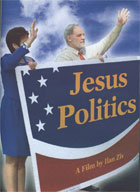
Jesus Politics: The Bible and the Ballot 2008
Distributed by Icarus Films, 32 Court St., 21st Floor, Brooklyn, NY 11201; 800-876-1710
Produced by Ilan Ziv and Serge Gordey
Directed by Ilan Ziv
DVD, color, 90 min.
College - Adult
Political Science, Religious Studies
Date Entered: 01/29/2009
Reviewed by Timothy W. Kneeland, History and Political Science Department, Nazareth College of Rochester, Rochester, NYJesus Politics is a lengthy, confused, and unfocused attempt to look at the role of religion in contemporary American politics. Filmmaker Ziv was raised in Israel and witnessed first-hand the destructive melding of politics and religion in the form of Israeli and Palestinian relations. Disgusted by his experience as an Israeli soldier, Ziv fled to the United States to live in a society he assumed would not mix religion and politics. Ziv was aghast by the increasing rhetoric of religion in American politics that followed the September 11, 2001 terrorist attacks on the United States. Jesus Politics represents Ziv’s efforts to penetrate the meaning of this new religious rhetoric. To better understand the connection, Ziv traveled the caucus and primary circuit to talk with and listen to religious activists who supported Obama, McCain and Huckabee. Despite the interesting premise of the film, the resulting documentary serves less as an exploration of religion in American politics in 2008 and more as a documentary that supports Ziv’s presupposition that any melding of religion and politics is dangerous.
The documentary is flawed on many levels. There is not inherent logic to the film. Ziv provides no clear justification for why only Obama, McCain and Huckabee were chosen from the field of Democrat and Republican candidates seeking the nomination. Absent from this film is Republican contender Mitt Romney’s “John F. Kennedy” moment. Just weeks before the Iowa Caucus former Massachusetts Governor Romney made a speech separating his Mormon faith from his politics. The speech echoed one made by John F. Kennedy forty years ago in which Kennedy made a clear distinction between Catholic faith and his politics. Romney’s speech would have placed the film and the election of 2008 into the broader context of American history. Ziv also gives short shrift to Hillary Clinton. Clinton, who was a more viable contender for the nomination on the Democratic side than Mike Huckabee was on the Republican side, is not mentioned at all. By contrast Ziv spent a good deal of time following Huckabee’s religious supporters. Ziv is also silent about the controversial statements of Reverend Jeremiah Wright. Wright’s views are not addressed in the film. A gaping hole in the historic record to be sure. Remarkably, the endorsement of John McCain by a conservative evangelical named John Hagee is given a great deal of attention. Hagee has some extreme ideas and has a small following among evangelicals but his ideas are not considered mainstream by the bulk of evangelicals. A more representative figure for evangelicals is James Dobson who runs Focus on the Family and whose radio show often has political themes. Ziv does not mention Dobson at all. The overall logic of the film remains a mystery. The choices may reflect Ziv’s misunderstanding of American Protestantism or his attempt to cherry-pick people and events that support his own presuppositions.
The film is in need of editing to provide greater coherence. Alas, it seems that Jesus Politics is merely a retread of the “watch out because the conservatives are religious zealots” paradigm. However, there are more worthy films that make this point, among them Randall Balmer’s Mine Eyes Have Seen the Glory, which is one of the best.
Overall, the film would not work in a classroom setting. On the one hand, at 90 minutes it is too long to be shown in one classroom sitting, and on the other hand there is too little academic merit in any of the individual scenes.
Not Recommended.